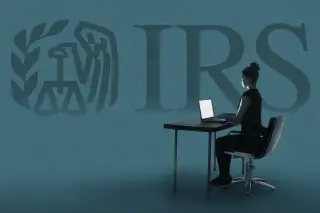‘Simply Unacceptable’: The IRS Is Facing Backlash Over its Facial Recognition Tech

[UPDATE: On the afternoon of Monday, Feb. 7, the IRS announced it will transition away from using third-party verification involving facial recognition. "The transition will occur over the coming weeks in order to prevent larger disruptions to taxpayers during filing season," the agency said via a press release.]
The IRS is facing widespread backlash right now — and no, it's not because of the agency's backlog of tax returns.
The latest criticism is over the IRS's use of facial recognition software, which has drawn the attention of lawmakers and privacy advocates, among others.
Starting this summer, Americans who want access to certain records via the IRS website, like information about child tax credits and payment plans, will need to use a new sign-in and identity verification system that includes taking a video selfie.
The IRS is using ID.me, a third-party technology company that provides online identity verification. People who already have accounts with the IRS can continue to use their existing credentials until this summer, but are being "prompted to create an ID.me account as soon as possible," according to a statement the IRS issued in November.
If you're a new user and need to create an IRS account, the agency says that you should create an account with ID.me, which the agency describes as its "trusted technology provider in helping to keep your personal information safe."
You don't need to submit a selfie to the IRS to file your taxes. But there are certainly useful aspects to an account with the IRS, like the ability to request an online tax transcript.
The IRS, facial recognition and privacy concerns
The IRS already has tons of our personal information, but people are understandably creeped out by the idea of the agency also having recordings of our faces.
"I’m very disturbed that Americans may have to submit to a facial recognition system, wait on hold for hours, or both, to access personal data on the IRS website," Chairman of the Senate Finance Committee Ron Wyden, D-Ore., tweeted in January. "While e-filing returns remain unaffected, I’m pushing the IRS for greater transparency on this plan."
In a letter sent Monday to IRS commissioner Charles Rettig, Wyden called the facial recognition move "simply unacceptable" and called on the agency to reverse its decision, The Washington Post reported. (The Post's editorial board also weighed in on the controversy in an opinion piece, saying the extra verification procedure would be a "mistake" and that "low-income Americans often lack the necessary technology, and research shows people of color are more likely to be misidentified.")
Wyden isn't alone. Politicians on both sides of the aisle are demanding more transparency from the IRS. Sen. Roy Blunt, R-Mo., and Sen. Jeff Merkley, D-Ore., sent a letter to Rettig last week demanding that the agency "immediately discontinue any programs that collect, store, and use any type of biometric data to identify American taxpayers," according to a press release from Blunt's office. Sen. Roger Wicker, R-Miss., sent Rettig a letter asking for additional information from the IRS, including how the IRS came to the decision, if there will be an option to opt-out of the requirement and whether there are controls in place to limit ID.me's use of taxpayer data.
Meanwhile, Rep. Ted Lieu, D-Calif., tweeted that the facial recognition requirement by the IRS was "a very, very bad idea" that will "will further weaken Americans’ privacy."
Consumer advocates are also condemning the move. Jeramie Scott, senior counsel at the Electronic Privacy Information Center, told NPR there are safety concerns with outsourcing this information and that it creates "another kind of target for criminals."
Several civil rights groups have also started a petition asking the IRS to reverse its decision.
What's next for IRS face scanning?
Blake Hall, CEO and founder of ID.me, issued a statement that the company is "committed to ensuring everyone can verify their identity online and use it to access essential services." He added that the "1:1 face match is comparable to taking a selfie to unlock a smartphone" and that ID.me does not sell the personal information of its users.
“We are committed to working together with the IRS to implement the best identity verification solutions to prevent fraud, protect Americans’ privacy, and ensure equitable, bias-free access to government services," ID.me said in a written statement to Money.
Still, the government may now be backtracking. The Treasury Department is reconsidering the IRS's use of ID.me for access to the agency's website, Bloomberg News reported in late January.
When asked for comment from Money, the IRS provided an earlier statement from the Treasury, which said, "The IRS is consistently looking for ways to make the filing process more secure but to be clear, no American is required to take a selfie in order to file their tax return. We believe in the importance of protecting the privacy of taxpayers, while also ensuring criminals are not able to gain access taxpayer accounts."
The statement also said that "the lack of funding for IRS IT modernization has made it impossible for the IRS to invest in state-of-the-art technology," and that the agency uses third-party providers to validate the identification of people attempting to improperly gain access to taxpayers' accounts.